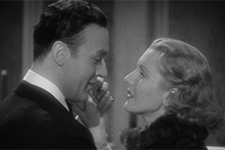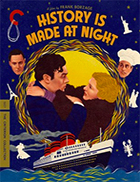History is Made at Night [Blu-Ray]
|

For just about every conceivable reason, Frank Borzage's History is Made at Night shouldn't work. But, it does. The film is a wild and entertaining mis-mash of styles, tones, and genres, a kind of barely controlled chaos reflected in its production. Overseen by producer Walter Wanger, who had recently started his own independent production company after more than a decade working for Paramount, MGM, and Columbia, shooting commenced with only half the screenplay written, and the climactic sequence involving a Titanic-like passenger ship striking an iceberg and threatening to sink was added during the last two weeks of production, necessitating reshoots of earlier scenes. The casting was a brilliant hodgepodge of unexpected, dangerous, and inspired choices: Jean Arthur, who was known primarily as a quick-witted comedienne, was cast in a serious dramatic role; the villain, Frankenstein's Colin Clive, was suffering from intense alcoholism and would die before the film was released; and the suave, heavy-lidded lead was played by Charles Boyer, a French actor under contract to Wagner who had only recently made inroads in Hollywood, but was well on his way to becoming an international romantic icon. At some points, History is Made at Night (which Andrew Sarris called "the most romantic title in the history of cinema") plays like a stark melodrama, while at other points it plays like a romantic comedy, and it even has scenes that feel like they were ripped from a Hitchcockian thriller. Conventional thinking suggests that a cinematic stew of this sort shouldn't work as classical entertainment, and yet it does. Again and again. Borzage, who was known for his romantic sensibilities and had already won two Best Director Oscars, including the first ever awarded for his 1929 silent film 7th Heaven, was an alchemist, and here he is at the top of his game, stitching together disparate storylines and ideas and tones into something that feels entirely of a piece. The main storyline, which is credited to screenwriters Gene Towne and C. Graham Baker (regular collaborators who wrote more than 20 films together between 1933 and 1940), with additional dialogue credited to Vincent Lawrence and David Hertz, involves a love triangle. Irene Vail (Jean Arthur) is the abused wife of maniacal shipping magnate Bruce Vail (Colin Clive), who she is trying to divorce. Bruce will have nothing of it, and he conspires to have his chauffeur Michael (Ivan Lebedeff) force himself upon her, at which point he will "catch her" in another man's arms, thus derailing her divorce claims. The plan is foiled by Paul Dumond (Charles Boyer), a debonaire headwaiter who overhears the commotion and rescues Irene by pretending to be a burglar who has broken into the apartment. He whisks her away, and they spend a romantic night at Chateau Bleu, the Parisian restaurant at which he works that is overseen by Cesare (Leo Carrillo), the comically egotistical Italian chef. Alas, as with all great romances, there are roadblocks between Paul and Irene's happily-ever-after, most of which are driven by Bruce's borderline-insane jealousy and refusal to let her go. At one point Irene disappears into the United States, and Paul, in a fit of romantic desperation, goes there with Cesare to open a restaurant that will be such the talk of the town that it will lure her out and they can be reunited. And then, of course, there's that ship and iceberg I mentioned earlier … Borzage manages the narrative messiness and frank absurdities of the plot with such a deft touch and romantic confidence that you can't help but admire the coherence of his achievement. He is helped in large part by his cast, who fill their roles exceedingly well, even when cast against type. Boyer is as smooth as he is dedicated to his romantic cause, while Jean Arthur gives Irene a genuine sense of headstrong independence and strength that is nevertheless hardly immune to the lure of true love. Clive's own personal demons haunt his performance as the demented magnate-husband who is incapable of imagining someone not wanting to be with him; he brings notes of true horror to the film, and it is one of the great tragedies that his own life ended so abruptly. Special note should also be made of Leo Carrillo's comical supporting role as Cesare, which easily could have been limited to ethnic humor, but instead becomes a portrait of real friendship and devotion. History is Made at Night is at its heart a swooning romance between Paul and Irene, but that is only made possible by Paul and Cesare's bickering bromance. That the film not only has room to include this relationship, but makes it feel as genuine as it does is testament to Borzage's artistic prowess in making the impossible possible.
Copyright © 2021 James Kendrick Thoughts? E-mail James Kendrick All images copyright © The Criterion Collection | |||||||||||||||||||||||||||||
Overall Rating:



 (3.5)
(3.5)
Subscribe and Follow
Get a daily dose of Africa Leader news through our daily email, its complimentary and keeps you fully up to date with world and business news as well.
News RELEASES
Publish news of your business, community or sports group, personnel appointments, major event and more by submitting a news release to Africa Leader.
More Information
